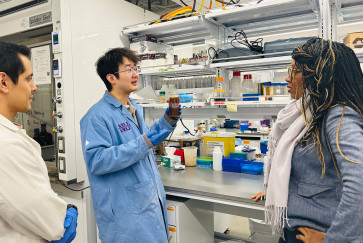A common environmental bacterium, Comamonas testosteroni, could someday become nature’s plastic recycling center. While most bacteria prefer to eat sugars, C. testosteroni, instead, has a natural appetite for complex waste from plants and plastics.
In a new Northwestern University-led study, researchers have, for the first time, deciphered the metabolic mechanisms that enable C. testosteroni to digest the seemingly undigestible. This new information could potentially lead to novel biotechnology platforms that harness the bacteria to help recycle plastic waste.
Comamonas species are found nearly everywhere — including in soils and sewage sludge. C. testosteroni first caught researchers’ attention with its natural ability to digest synthetic laundry detergents. After further analysis, scientists discovered that this natural bacterium also breaks down compounds from plastic and lignin (fibrous, woody waste from plants).
Although other researchers have worked to engineer bacteria that can breakdown plastic waste, Aristilde believes bacteria with natural abilities to digest plastics hold more promise for large-scale recycling applications.
“Soil bacteria provide an untapped, underexplored, naturally occurring resource of biochemical reactions that could be exploited to help us deal with the accumulating waste on our planet,” said Northwestern’s Ludmilla Aristilde. “We found that the metabolism of C. testosteroni is regulated on different levels, and those levels are integrated. The power of microbiology is amazing and could play an important role in establishing a circular economy.”
The study was led by Aristilde, an associate professor of civil and environmental engineering at Northwestern’s McCormick School of Engineering, and Ph.D. student Rebecca Wilkes, who is the paper’s first author. The study included collaborators from University of Chicago, Oak Ridge National Laboratory and Technical University of Denmark.
Kicking sugar
Most projects to engineer bacteria involve Escherichia Coli because it is the most well-studied bacterial model organism. But E. Coli, in its natural state, readily consumes various forms of sugar. As long as sugar is available, E. Coli will consume that — and leave the plastic chemicals behind.
“Engineering bacteria for different purposes is a laborious process,” Aristilde said. “It is important to note that C. testosteroni cannot use sugars, period. It has natural genetic limitations that prevent competition with sugars, making this bacterium an attractive platform.”



